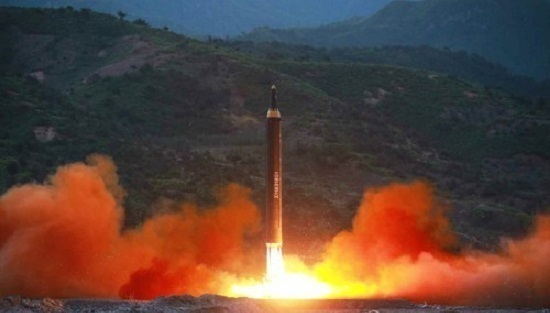North Korea fired "at least one" short-range ballistic missile from its eastern coast early Monday morning, South Korea's military said, with the provocation triggering a strong condemnation by the South's new government seeking to improve inter-Korean ties.
The missile, presumed to be a Scud type, was launched eastward from the vicinity of Wonsan, Gangwon Province, at around 5:39 a.m., according to the Joint Chiefs of Staff.
"The flight distance is around 450 kilometers," Army Col. Roh Jae-cheon, the JCS's spokesman, told reporters. "It flew at an apogee of some 120 km."
The missile, presumed to be a Scud type, was launched eastward from the vicinity of Wonsan, Gangwon Province, at around 5:39 a.m., according to the Joint Chiefs of Staff.
"The flight distance is around 450 kilometers," Army Col. Roh Jae-cheon, the JCS's spokesman, told reporters. "It flew at an apogee of some 120 km."

Japan earlier said the missile dropped in its exclusive maritime economic zone.
He indicated the North might have fired multiple missiles in its latest provocation.
"For now, it's assumed to be at least one, but an analysis is under way on the specific number," he said.
President Moon Jae-in immediately ordered a National Security Council session, said the JCS. The meeting was presided over by Moon's national security adviser Chung Eui-yong.
The South's troops issued a warning message.
"North Korea's continued provocative acts will only quicken its isolation and face strong retaliation by our military, the South Korea-US alliance and the international community," the JCS said.
It pointed out that the missile firing is a clear violation of the UN Security Council resolutions banning the North from conducting any launches using ballistic missile technology.
The South's Foreign Ministry echoed the view.
"The government will not tolerate any kinds of provocation and take stern action," it said in a separate statement. "The North should stop all provocations immediately and move toward the denuclearization path as quickly as possible."
The US Pacific Command confirmed the launch of a "short range ballistic missile occurred near Wonsan Airfield," saying it was tracked for six minutes until it landed in the East Sea.
"The North American Aerospace Defense Command assessed that the missile launch from North Korea did not pose a threat to North America," the Hawaii-based command said in an emailed statement. "US Pacific Command stands behind our ironclad commitment to the security of our allies in the Republic of Korea and Japan."
US President Donald Trump was also briefed on the North's provocation, a White House official said.
The Japanese government strongly denounced the North as the missile appears to have landed in waters near its territory.
"This ballistic missile launch by North Korea is highly problematic from the perspective of the safety of shipping and air traffic, and is a clear violation of United Nations Security Council resolutions," Chief Cabinet Secretary Yoshihide Suga said.
The North's Scud missiles using liquid fuel is known to have a range of 300-500 km, mainly targeting the South.
It has recently developed a Scud variant, called Scud-ER (extended range), capable of traveling as far as 1,000 km. It means Japan is within its range.
There's speculation that the reclusive state may be trying to develop anti-ship ballistic missiles against American aircraft carriers.
Monday's launch marked the communist nation's ninth missile test this year and the third since the launch of the Moon administration on May 10, which is seeking to reach out to the neighbor.
The North fired a mid-range missile, known as the Pukguksong-2, on May 21 and conducted a KN-06 surface-to-air guided missile test Saturday.
It came as the South is apparently flexing its muscles to resume humanitarian assistance for the North.
Last week, the Unification Ministry approved an application by a local civic group to contact the North for the delivery of mosquito nets and insect repellents.
The decision was viewed as reflecting the liberal Moon administration's desire to reopen dialogue with Pyongyang despite increased military tensions.
"The government will respond strongly to any North Korean provocations, but at the same time, we are flexibly reviewing ways to allow humanitarian and civilian exchanges without compromising international sanctions," a ministry official said.
The international community has intensified pressure on the defiant North.
Wrapping up a meeting in Italy on the weekend, the leaders of the Group of Seven member countries agreed that North Korea "increasingly poses new levels of threat of a grave nature to international peace and stability."
They urged the North to "immediately and fully comply with all relevant UN Security Council resolutions, and abandon all nuclear and ballistic missile programs in a complete, verifiable and irreversible manner." (Yonhap)


![[AtoZ into Korean mind] Humor in Korea: Navigating the line between what's funny and not](http://res.heraldm.com/phpwas/restmb_idxmake.php?idx=644&simg=/content/image/2024/04/22/20240422050642_0.jpg&u=)
![[Exclusive] Korean military set to ban iPhones over 'security' concerns](http://res.heraldm.com/phpwas/restmb_idxmake.php?idx=644&simg=/content/image/2024/04/23/20240423050599_0.jpg&u=20240423183955)



![[Graphic News] 77% of young Koreans still financially dependent](http://res.heraldm.com/phpwas/restmb_idxmake.php?idx=644&simg=/content/image/2024/04/22/20240422050762_0.gif&u=)
![[Herald Interview] Why Toss invited hackers to penetrate its system](http://res.heraldm.com/phpwas/restmb_idxmake.php?idx=644&simg=/content/image/2024/04/22/20240422050569_0.jpg&u=20240422150649)





![[Exclusive] Korean military to ban iPhones over security issues](http://res.heraldm.com/phpwas/restmb_idxmake.php?idx=652&simg=/content/image/2024/04/23/20240423050599_0.jpg&u=20240423183955)



![[Today’s K-pop] Ateez confirms US tour details](http://res.heraldm.com/phpwas/restmb_idxmake.php?idx=642&simg=/content/image/2024/04/23/20240423050700_0.jpg&u=)